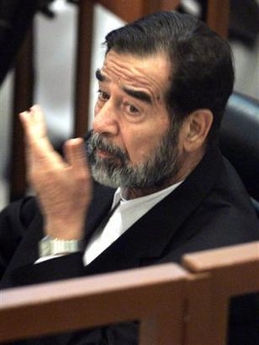The judge in Saddam Hussein's trial ejected a spectator from the courtroom
Monday after lawyers accused the man of belonging to a Shiite militia and
threatening the defense team.

Former Iraqi President
Saddam Hussein gestures while listening to the testimony of a defence
witness during his trial held at the fortified Green Zone in Baghdad
Monday May 29,2006. [AP] |
The removal was a reminder of the conflicts raging outside the courtroom
during a trial that has moved quickly in the past month, with defense witnesses
testifying in the case against Saddam and seven former members of his regime.
Eight more witnesses took the stand Monday, insisting that Saddam was not
seeking revenge against Shiites when he launched a sweep of arrests after a 1982
assassination attempt in Dujail and that 148 people sentenced to death got a
fair trial.
During one witness' testimony, a defense lawyer stood and complained to chief
judge Raouf Abdel-Rahman that a man in the spectators' balcony was whispering to
another person and "pointing at me."
"He is a member of the Badr Brigade," the lawyer said, referring to a militia
linked to one of the Shiite parties in Iraq's governing coalition. "He once
threatened one of my colleagues, who had to quit because of it."
The lawyer said he notified the U.S. military of the threats, and
Abdel-Rahman asked why he did not tell the judges.
"You can't protect me because we are all vulnerable even you," answered the
lawyer, whose name has not been released by the court.
Abdel-Rahman ordered the spectator to leave. He was seated in the balcony
above the journalists' booth and could not be seen.
Two defense lawyers were killed soon after Saddam's trial began seven months
ago, believed to be victims of reprisal attacks by enemies of the ousted Iraqi
leader. The attacks prompted demands by the defense for greater protection.
Since then, sectarian violence has spread through a wave of Sunni-Shiite
reprisal attacks, many of them blamed on the Badr Brigade and other Shiite
militias.
Saddam and seven former members of his regime are being tried on charges of
crimes against humanity for killings, torture and the imprisonment of families
during the Dujail crackdown.
The court heard testimony on behalf of Saddam and two of his top
co-defendants ¡ª former intelligence chief Barzan Ibrahim and the former
Revolutionary Court head Awad al-Bandar. After a five-hour session, the court
adjourned until Tuesday.
Witnesses argued that Saddam was justified in responding after gunmen of the
Iran-backed Shiite Dawa Party opened fire on his motorcade.
Mohammed Zimam Abdul-Razaq, the former governor of Salaheddin province, where
Dujail is located, said the shooting was a serious attempt by Iran to overthrow
Saddam.
"There was an assassination attempt, and we heard so from Iranian officials
afterward. But your honor, killings are still going on till now, hundreds of
Baathis and tribal leaders are being assassinated everyday," Abdul-Razaq said.
Another witness, Mohammed Thiab Ahmed al-Mashhadani, was asked by defense
lawyers if Saddam ordered "systematic, wide-scale attacks" in revenge for
attacks by his opponents, using the phrasing of the accusations against Saddam.
"Those who know President Saddam Hussein know that's not in his nature," said
al-Mashhadani, who as interior minister was in charge of police in the 1990s and
heading irrigation projects in Dujail.
"He was subjected to an attempt to assassinate him. But he put the matter
into the hands of the proper authorities under the law ... and those behind it
were tried in accordance to the law. I knew Saddam from 1991 until 2003, and
I've never heard anyone speak of him except positively."
The prosecution has argued that the 148 effectively received a show trial by
Saddam's Revolutionary Court and had no chance to defend themselves. It has
presented documents showing that children were among those sentenced to death.
Al-Bandar has insisted the trial was fair and that all the defendants
confessed to a role in the attack. But he has acknowledged that there was only
one defense lawyer for all 148 and that the trial only lasted 16 days.
"Mr. al-Bandar took the humanitarian aspect into consideration, and he was
fair and made all judgment according to law," said the first witness, a lawyer
who worked at the court.
Speaking behind a curtain to preserve his anonymity, the witness said the
court appointed lawyers for defendants who could not hire them and allowed all
defendants to "talk freely."
U.S. observers have said Saddam's trial could be wrapped up by late June,
after which the court would adjourn to consider a verdict.